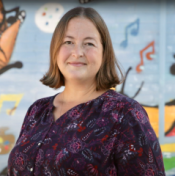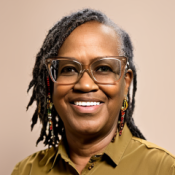Different ways of thinking, different ways of thriving: How ASU is supporting students with autism

The Building Bridges to College and Beyond for Autistic and Neurodivergent Students event — led by the College Autism Network, with sponsorship from ASU — will be held at Mesa Community College from Feb. 20–21. ASU photo
According to the CDC, over 5.4 million adults in the U.S. are living with autism spectrum disorder, a condition that affects how individuals interact with others, learn and process information. Many individuals with autism are highly intelligent and capable students but may need additional support navigating the social, sensory and academic challenges of college.
Arizona State University has developed a range of programs to help autistic students succeed, from college preparation to career development. The latest effort in this space is Building Bridges to College and Beyond for Autistic and Neurodivergent Students, an event led by the College Autism Network — with sponsorship from ASU — to support current and prospective college students.
To be held at Mesa Community College from Feb. 20–21, the two-day event will welcome families, educators and accessibility professionals to discuss the college experience and ways to support students with autism. Faculty, staff and students from ASU and other institutions will share insights on navigating campus life, achieving academic success and planning for long-term opportunities.
ASU faculty to share experiences
With the number of autistic students in higher education growing to an estimated 400,000 nationwide, the Building Bridges event will provide a space for experts to share practical strategies for student success. The T. Denny Sanford School of Social and Family Dynamics, Ira A. Fulton Schools of Engineering and Student Accessibility and Inclusive Learning Services contributed to the event, and two ASU faculty and staff members will be participating in panels and presentations.
Krista Puruhito, associate teaching professor in the Sanford School of Social and Family Dynamics, will moderate two panels: “Navigating Campus as a Neurodivergent Student” and “Supporting Neurodivergent Students in the Transition to College and Being Successful in College.” Both panels will feature current college students sharing real experiences of campus life, from transportation and housing to mental health and more. Puruhito will also speak at a session titled “Creating Accessible and Trauma Friendly Postsecondary Learning Experiences,” which will discuss supportive, neurodivergent-friendly learning environments.
Adero Allison, assistant director of Student Accessibility and Inclusive Learning Services at ASU, will participate in the session “Choosing the Right College: What Do You Know, What Do You Need to Know?” alongside colleagues from Northern Arizona University and the University of Arizona. This session will help students and families evaluate college options, understand disability services and plan for long-term success.
"Students who are neurodivergent bring new ways of thinking and seeing the world to our educational and corporate institutions,” Allison said. “Arizona schools and colleges are coming together to ensure that these individuals have the best skills to apply their out-of-the-box thinking to the problems of the 21st century."
ASU’s approach to supporting students with autism
The university’s involvement in the event arises from a larger commitment to providing autistic students with the resources and guidance they need to succeed. Programs like GATE (Growth, Achievement, Transformation, Enrichment) and EASE (Employment Assistance and Social Engagement) provide structured support with both academic and professional development.
GATE — a collaboration between Student Accessibility and Inclusive Learning Services, the Sanford School of Social and Family Dynamics and Career Services — offers students one-on-one coaching, peer mentorship and executive function skill-building workshops. Students take structured courses on college success and career readiness, participate in social engagement activities and receive guidance on developing independence and self-advocacy.
EASE, developed by faculty in the Fulton Schools of Engineering and the College of Health Solutions, is designed specifically for autistic engineering students. It pairs students with peer mentors and provides training in social engagement and career preparation, ensuring they gain both technical expertise and the professional skills needed for STEM careers.
Beyond these programs, the Sanford School of Social and Family Dynamics is expanding its focus on inclusive education and accessibility by developing new courses and research aimed at improving education and workplace outcomes for neurodivergent individuals. Upcoming courses include Introduction to Executive Functioning and Career Development, both of which focus on developing skills for students to succeed in college and their careers.
“In keeping with the ASU Charter, I am proud to be able to partner with the College Autism Network and other Arizona institutes of higher education to help neurodivergent students and their families explore college,” Puruhito said. “I am also excited to expand professional development for staff and faculty to better support neurodivergent students. Having a thriving, diverse student body really contributes to the rich learning experience that we provide here at ASU, and this includes autistic and other neurodivergent students.”
More Arts, humanities and education

Upcoming exhibition brings experimental art and more to the West Valley campus
Ask Tra Bouscaren how he got into art and his answer is simple.“Art saved my life when I was 19,” he says. “I was in a dark place and art showed me the way out.”Bouscaren is an …

ASU professor, alum named Yamaha '40 Under 40' outstanding music educators
A music career conference that connects college students with such industry leaders as Timbaland. A K–12 program that incorporates technology into music so that students are using digital tools to…

ASU's Poitier Film School to host master classes, screening series with visionary filmmakers
Rodrigo Reyes, the acclaimed Mexican American filmmaker and Guggenheim Fellow whose 2022 documentary “Sansón and Me” won the Best Film Award at Sheffield DocFest, has built his career with films that…



